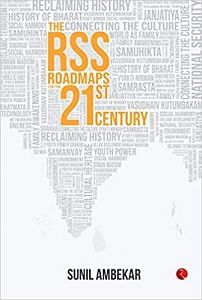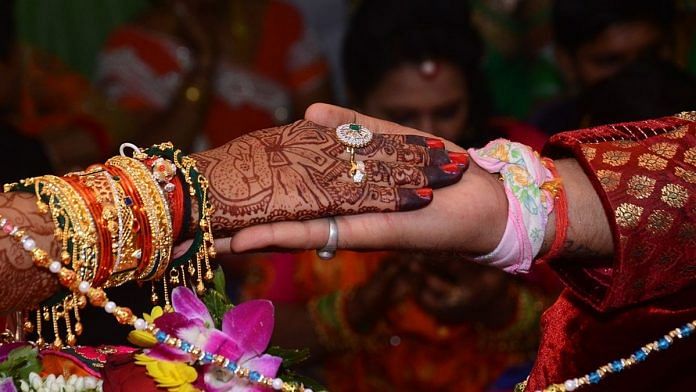The gift of family can hold humanity together. A resolution was passed at a meeting of ABPS in March 2019, which talks about the importance of the family system, its present challenges and possible ways to secure a happy and fulfilling family life.
There were many who questioned why such a resolution came about. While some felt that the Sangh was overthinking such issues, most felt that the family is the basic functional unit in society and the ultimate social institution that needs attention.
In modern times, conversations pertaining to interrelations within families are required to address the inadequacies which have emerged in imparting value education to the next generation, especially small children – the social and national duties of families and their daily-life schedules. Such a resolution is the need of the hour. The Indian family system covers everyone and there is no need to categorize it into Hindu, Muslim, Christian and so forth. A happy family life is everyone’s desire and a well-known Indian tradition.
Of the five main activities of the RSS, the first one is Kutumb Prabodhan while the other four are Gram Vikas, Gau-Vikas (developing cow-based economy), Dharam Jagran and Samrasta (social harmony). A new activity called Paryavaran vikas (environmental development) was added to this collective. Kutumb Prabodhan is public awareness combined with dialogue activity. It answers the question of what ingredients are needed for a happy and successful family life in the present context. It is an expectation that all swayamsevaks will lead by example, and pay attention to whatever changes are required in their families while maintaining traditional strengths. This shows that Sangh gives primacy to the individual and family, for it is their qualities that reflect upon society and influence national life. Indian values owe their existence to our sturdy and resilient family system. In the thousands of years of our history, Indian families have given birth to great sons and daughters, educated them and given them the right ethics with which they have served the country.
Also read: RSS roadmap for 21st century India — rewrite history, ‘Indianise’ education, museum revamp
Social challenges
Over time, certain flaws that have emerged within our families are showing up in our society. For example, the rate of divorce and separation between couples is rising, though the overall number is still small. Crimes committed by men against women due to certain mindsets are on the rise, both in rural and urban areas.
This number is small compared to worldwide trends, but society is gravely concerned about the rising instances of crimes against women, especially in the backdrop of Indian cultural values. Other social issues, too, have cropped up, like abandoned, illegitimate children, sending elderly parents to old-age homes, live-in relationships and dysfunctional marriages. Though these instances are few, they show the weaknesses and abdication of responsibility in our families, which gives momentum to other decadent behaviours.
The Sangh views this very seriously. In the twenty-first century, with modernization, economic growth, urbanization, internal migration for work and work-life balance, there is a deep thinking about the nature of family life and how its idyllic pattern can be maintained. The family is the centre of romantic sentimentalism, but it is also the fundamental instrument for social good. The Sangh believes that given her traditional Indian values and a rich, caring cultural history, India should be able to present the example of a sound family system to the whole world.
Also read: Feminism a Woodstock-inspired fad, snug families can check rape, says new RSS book
An idyllic family
In the traditional Indian context, ‘grihastha’, or householder life, is sacrosanct. It is a coming-of-age requirement that is enjoined upon everyone as it bears the responsibility for bringing up the next generation. Only in special circumstances, where people give themselves up for a social or spiritual purpose, can they step outside this life. When householders fulfil their duties, society is crafted and sustained.
The husband and wife living happily together, bringing up their child with equal involvement, caring for their parents – these features are symbolic of a civilized society. The upbringing of children is a joint responsibility. The father has to work as much as the mother does in bringing up the child. Childcare responsibilities have to be shared. The Hindu ideal is the Shiva-Parvati marriage and their mutual relationship on an equal footing as they move forward towards completeness. There is no man-woman super-ordination or subordination. There is equality and the promise of a life together. The Ardhanarishvara form of Shiva-Parvati represents the state of complete compatibility in marriage and the synthesis of man and woman in holy matrimony. This idea, as old as Indian civilization, captures the imagination of people to this day and is the bedrock of our family system.
In India, marriage traditionally means the coming together of two families and not just two individuals becoming a married couple. Everyone, including the couple, needs to work to ensure that relations within families are harmonious. Families are not meant to stay in isolation. They should maintain harmonious relations with relatives, neighbours and the community, for society is a network of relationships.
Due to work-related compulsions and greater movement to cities with smaller houses, there is a spurt in the growth of nuclear families. But even these nuclear families have maintained their relations with the larger families.
Householders traditionally perform several key roles. They care not only for their own children but are also concerned about those in need. They educate the next generation, maintain religious festivals and instructions and instil the mentality of national service among family members. Our country has functioned in this manner for centuries. In old times, making meal arrangements for students was considered a pious act. Even today, a large number of families gladly bear this duty. Pracharaks being hosted by families or activists on tour staying as house guests with families are a usual occurrence in Sangh Parivar circles. Thousands of families, spread across the length and breadth of our country, feel blessed to look after pracharaks and activists in their homes. It is seen that children raised in such families develop deep empathy and a social conscience. They are eager and sensitive volunteers who help to ameliorate the sufferings of others in their surroundings.
Also read: Where is Ram Madhav — the RSS pracharak who was Modi’s Man Friday not long ago
 This excerpt from The RSS: Roadmaps for the 21st Century by Sunil Ambekar has been published with permission from Rupa Publications.
This excerpt from The RSS: Roadmaps for the 21st Century by Sunil Ambekar has been published with permission from Rupa Publications.




RSS types are not qualified to speak on marriages as most of them are bachelors.